旨在通过COS客户端实现图片随机访问。
废话不多说,咱们开始吧,搭建一个属于自己的随机图片图床。

一、环境和工具介绍
操作系统:Ubuntu 24.04 LTS
运维面板:1Panel 社区版 v1.10.23-lts
代理服务器 OpenResty:1.21.4.3-3-3-focal
PHP版本:8.3.8
Python版本:3.10
Composer版本:v2.8.5
小伙伴们可以自行选择对应的环境和工具,以上仅供参考。
二、前期准备
2.1 COS的部署
因为相关的教程,网上已经有很多了,所以这里我不在赘述了。
推荐一个相关教程:https://www.cnblogs.com/txycsig/p/18512703
注意这里创建存储桶时,因为图片要外部访问,所以要勾选公共读私有写。
后续可以根据自己的业务需求选择相应的配置。

2.2 PHP网站的搭建
首先创建一个运行环境
登录1panel运维面板,点击网络 -> 运行环境 -> 创建运行环境 ,
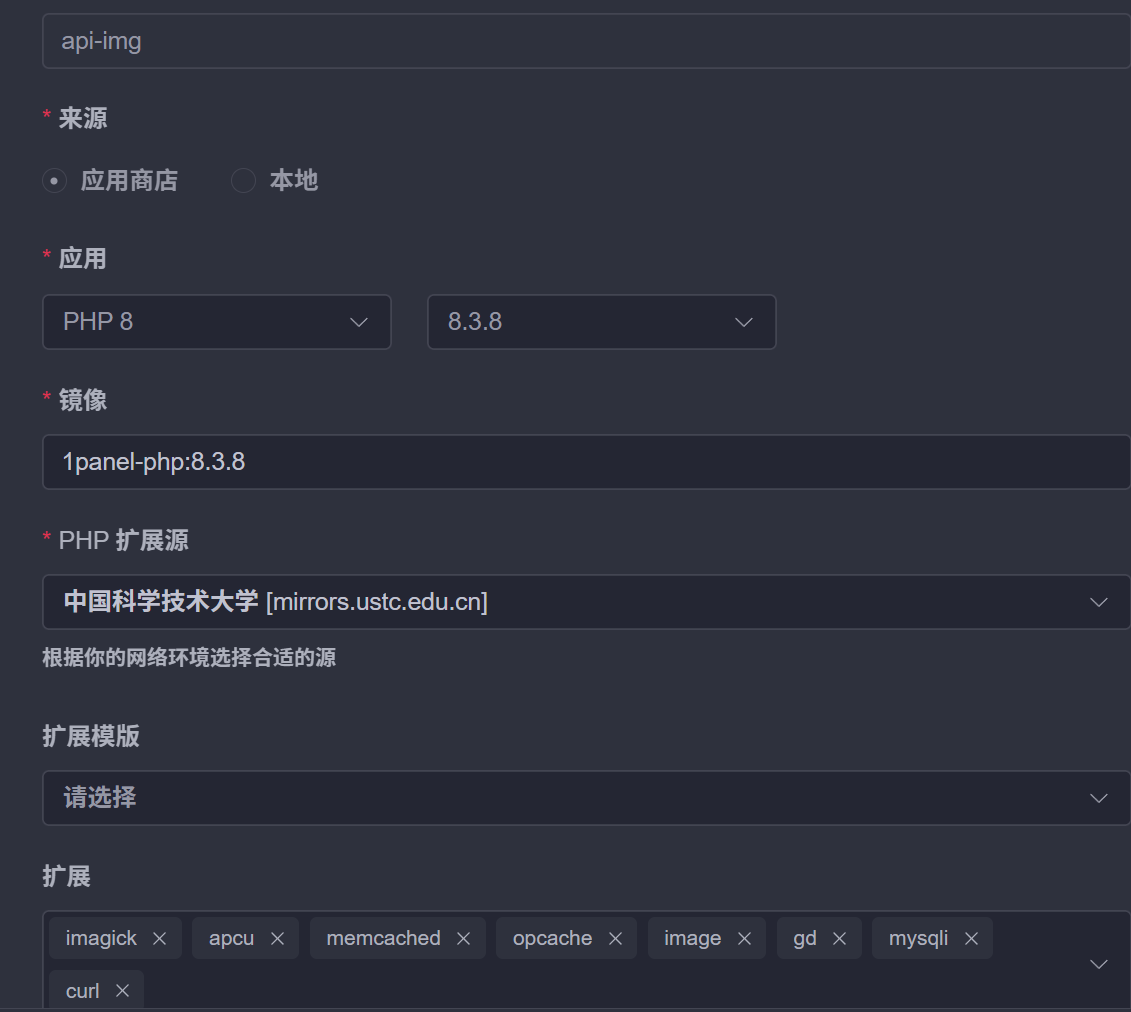
扩展按照自己的选择进行添加。
接下来就是创建网站:
运行环境的主域名设置成你的IP:端口
这里和PHP8端口冲突了,换一个就行,比如改成9001,后面的反向代理就是通过这个端口来获取资源。
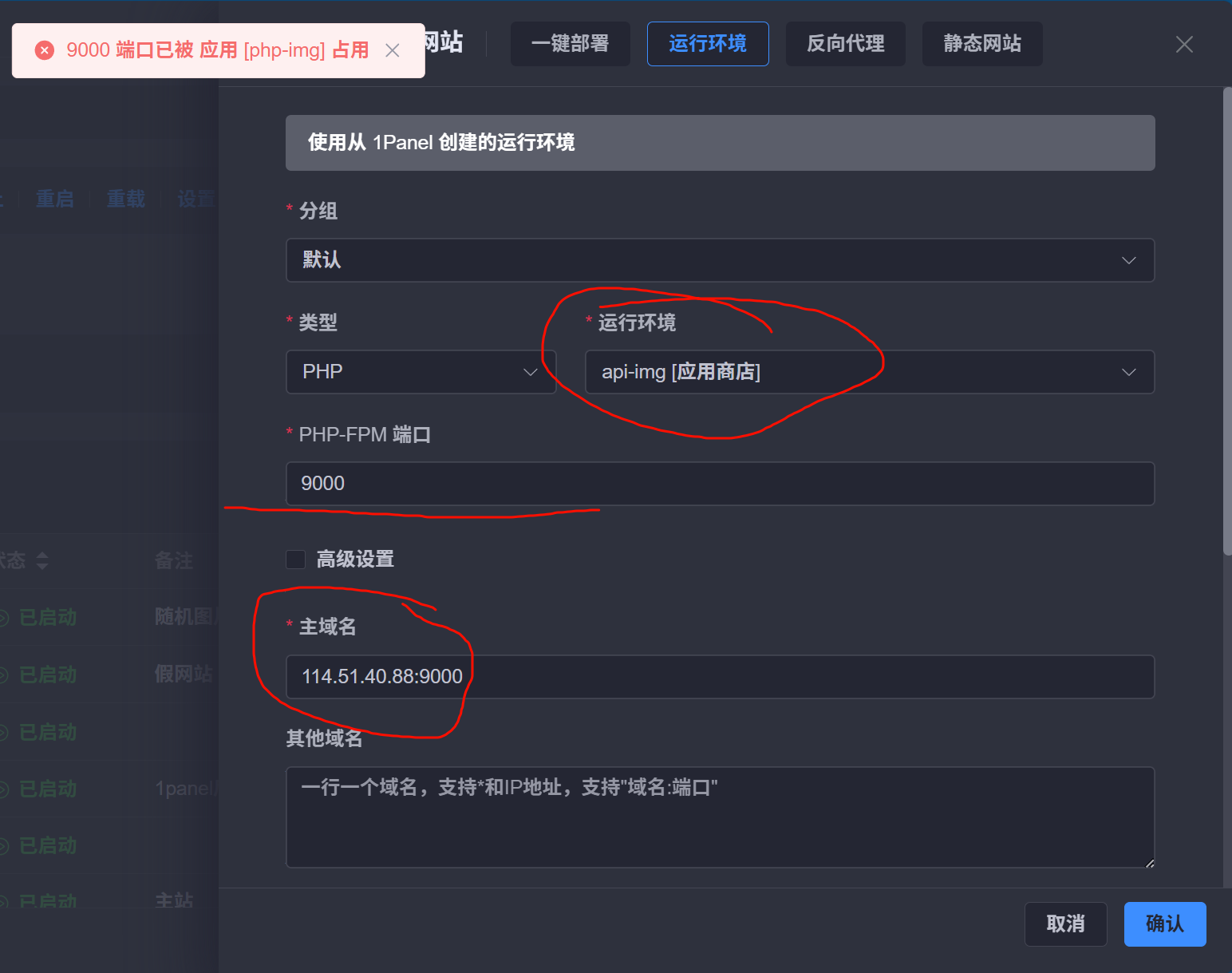
然后进入该网站目录的index文件夹,之后就可以上传你的php项目了:
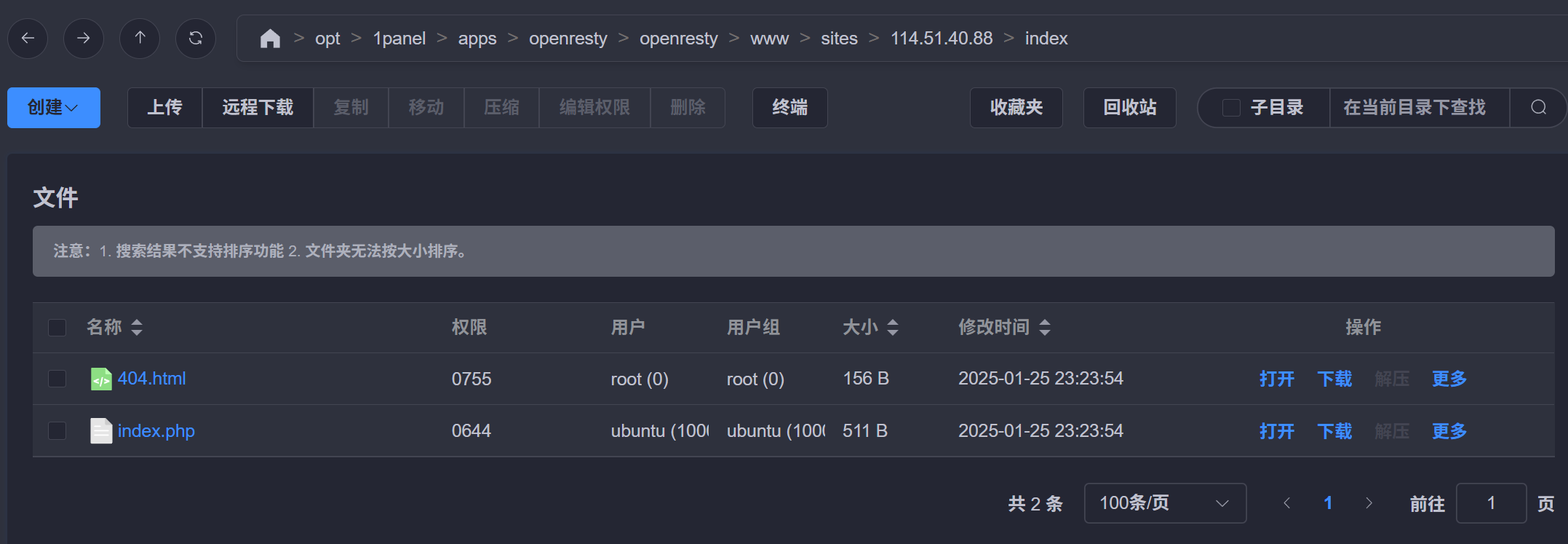
接下来可以选择的做反向代理:
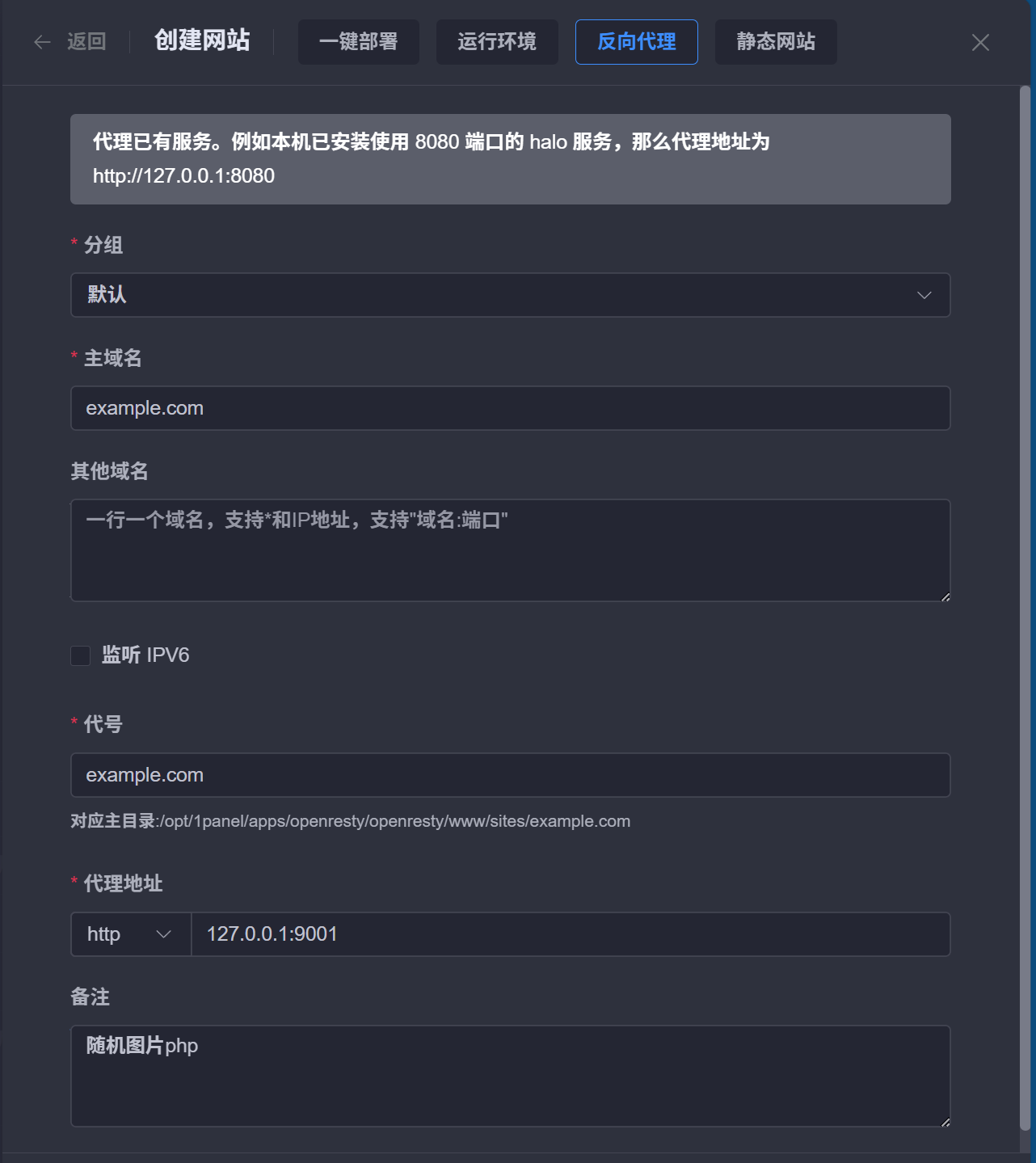
代理地址的端口号改成你自己所配置的PHP-FPM的端口。
至此PHP网站搭建完成。
三、代码的编写
3.1 图片分类和处理
这里我想做个api分类,要用到两类图,横屏、竖屏,分别对应文件夹landscape,portrait
可以写个py脚本来实现分类:
需要用到的库:
import io
import os
from PIL import Image
import time
from tqdm import tqdm
from concurrent.futures import ThreadPoolExecutor可能要处理的图片比较多,所以我这里用到了线程池处理:
def classify_images(source_folder):
"""
将图片分类到指定目录
:param source_folder: 待处理图片的文件夹路径
"""
image_files = [os.path.join(source_folder, f) for f in os.listdir(source_folder) if
f.lower().endswith(('.png', '.jpg', '.jpeg'))]
with tqdm(total=len(image_files), desc="Sorting images") as pbar:
with ThreadPoolExecutor(max_workers=4) as executor:
futures = [executor.submit(process_image, file_path) for file_path in image_files]
for future in futures:
future.result() # 等待线程完成
pbar.update(1)图片我是根据时间戳重命名处理,方便以后的管理:
def process_image(file_path):
"""处理单张图片"""
try:
with Image.open(file_path) as img:
# 获取图片尺寸
width, height = img.size
# 根据尺寸分类
if width > height:
destination = 'landscape' # 横屏
else:
destination = 'portrait' # 竖屏
# 如果图片过大则调整大小,取消注释使用
# img = resize_image(img)
# 生成时间戳和新文件名
timestamp = int(time.time() * 1000)
base_name = os.path.splitext(file_path)[0][-6:]
ext = img.format.lower().replace('jpeg', 'jpg').replace('png', 'png')
new_filename = f"{base_name}{timestamp}.{ext}"
new_file_path = os.path.join(destination, new_filename)
# 保存图片
img.save(new_file_path)如果你觉得原始图片大小过大,可以自己添加限制,这里我限制在5M以内:
def resize_image(img, max_size=5 * 1024 * 1024):
"""调整图片大小以满足最大文件大小限制"""
if img.size[0] * img.size[1] < max_size:
return img
quality = 95
img_byte_arr = io.BytesIO()
try:
if img.format == 'PNG':
img = img.convert('RGB')
img.save(img_byte_arr, format='JPEG', optimize=True)
img = Image.open(img_byte_arr)
else:
img.save(img_byte_arr, format=img.format, optimize=True)
if img.format == 'JPEG':
while img_byte_arr.getbuffer().nbytes > max_size and quality > 10:
img_byte_arr = io.BytesIO() # 重置字节流
img.save(img_byte_arr, format='JPEG', quality=quality, optimize=True)
quality -= 5
img_byte_arr.seek(0)
return Image.open(img_byte_arr)
except Exception as e:
print(f"Error resizing image: {e}")
return img3.2 图片上传
首先需要下载qcloud_cos依赖:
pip install qcloud_cos 需要用到的库:
import os
from qcloud_cos import CosConfig
from qcloud_cos import CosS3Client
from qcloud_cos.cos_exception import CosClientError, CosServiceError一些参数:
SECRET_ID = ''
SECRET_KEY = ''
REGION = '' # 例如ap-shanghai
BUCKET = '' # 桶名字
FOLDER_PATH = ['landscape', 'portrait'] # 文件夹名字,想要更多的分类可以继续往里添加
ALLOWED_EXTENSIONS = {'.jpg', '.jpeg', '.png'}
# 初始化配置和客户端
config = CosConfig(
Region=REGION,
SecretId=SECRET_ID,
SecretKey=SECRET_KEY
)
client = CosS3Client(config)上传的方法:
def upload_images_to_cos():
try:
for folder in FOLDER_PATH:
for root, dirs, files in os.walk(folder):
for filename in files:
ext = os.path.splitext(filename)[1].lower()
if ext not in ALLOWED_EXTENSIONS:
continue
local_path = os.path.join(root, filename)
object_key = os.path.relpath(local_path, start='.') # 获取相对当前目录的路径
object_key = object_key.replace('\\', '/')
# 上传文件
client.upload_file(
Bucket=BUCKET,
LocalFilePath=local_path,
Key=object_key,
PartSize=10,
MAXThread=10,
EnableMD5=False
)
print(f'上传成功: {local_path}')
except CosClientError as client_error:
print(f'客户端错误: {client_error}')
except CosServiceError as service_error:
print(f'服务端错误: [{service_error.get_status_code()}] {service_error.get_error_message()}')
except Exception as e:
print(f'其他错误: {str(e)}')3.3 php的依赖引入
腾讯云PHP SDK入口:https://cloud.tencent.com/document/product/382/43195
建议中国大陆地区的用户先设置腾讯云镜像源:
composer config -g repos.packagist composer https://mirrors.tencent.com/composer/在项目的目录下通过Composer下载SDK依赖,下载成功之后会在项目根目录下自动生成 vendor目录、composer.json和composer.lock文件:
composer require qcloud/cos-sdk-v5 通过Composer下载yaml依赖(可选),我是用来存放个人秘钥信息的:
composer require symfony/yaml 创建一个CosConfig.yaml,填入你的个人秘钥信息:
secretId: '' # 替换为你的 SecretId
secretKey: '' # 替换为你的 SecretKey
region: '' # 替换为你桶所在的地域。例:ap-shanghai
bucket: '' # 替换为你的桶名
domainCDN: '' # 替换为你的CDN加速域名(可选),例:https://example.com3.4 API编写
这里我编写了一个图片加载器(cos.php),通过连接腾讯云COS客户端,实现不同类型图片的访问。
<?php
require_once 'vendor/autoload.php';
use Symfony\Component\Yaml\Yaml;
use Qcloud\Cos\Client;
class ImageLoader
{
private Client $cosClient;
private array $config;
private string $prefix;
public function __construct(string $yamlUrl, string $dirUrl)
{
$this->config = Yaml::parseFile($yamlUrl);
$this->cosClient = $this->createCosClient();
$this->prefix = $dirUrl;
}
/**
* @return Client
* 连接cos客户端
*/
private function createCosClient(): Client
{
return new Client([
'region' => $this->config['region'],
'credentials' => [
'secretId' => $this->config['secretId'],
'secretKey' => $this->config['secretKey'],
],
'scheme' => 'https',
]);
}
/**
* @return array|null
* 获取cos图片列表
*/
public function getImgList(): ?array
{
return $this->executeCosRequest(function () {
$imgs = [];
$nextMarker = null;
do {
$params = [
'Bucket' => $this->config['bucket'],
'Prefix' => $this->prefix,
'MaxKeys' => 1000,
];
if ($nextMarker) {
$params['Marker'] = $nextMarker;
}
$result = $this->cosClient->listObjects($params);
if (isset($result['Contents'])) {
$files = array_slice($result['Contents'], 1);
foreach ($files as $file) {
$imgs[] = $this->config['domainCDN'] . "/" . $file['Key'];
}
// 这里如果不使用cdn的话,可以直接返回file的key:$file['Key']
}
$nextMarker = $result['NextMarker'] ?? null;
} while ($nextMarker);
return $imgs ?: null;
});
}
/**
* @param string $imgKey
* @return array|null
* 获取图片内容
*/
public function getImageContent(string $imgKey): ?array
{
return $this->executeCosRequest(function () use ($imgKey) {
return [
'body' => null,
'contentType' => null,
'cdnUrl' => $imgKey,
];
// // 不使用CDN
// $result = $this->cosClient->getObject([
// 'Bucket' => $this->config['bucket'],
// 'Key' => $imgKey,
// ]);
// return [
// 'body' => $result['Body']->getContents(),
// 'contentType' => $result['ContentType'],
// ];
});
}
/**
* @return array|null
* 获取随机图片
*/
public function getRandomImage(): ?array
{
$imgList = $this->getImgList();
if (empty($imgList)) return null;
$randomIndex = array_rand($imgList);
return $this->getImageContent($imgList[$randomIndex]);
}
/**
* @return void
* 输出随机图片
*/
public function outputRandomImage(): void
{
$imageData = $this->getRandomImage();
if ($imageData !== null) {
header('Location: ' . $imageData['cdnUrl'], true, 301);
exit;
// // 不使用cdn直接返回图片内容就行
// header('Content-Type: ' . $imageData['contentType']);
// echo $imageData['body'];
} else {
echo "没有找到图片。";
}
}
/**
* @param callable $request
* @return null
* 执行cos请求,统一异常处理
*/
private function executeCosRequest(callable $request): null
{
try {
return $request();
} catch (Exception $e) {
echo "操作失败: " . $e->getMessage();
return null;
}
}
}以下为自适应的调用例子,根据设备的不同类型($deviceUrl)选择相应的图片类型:
<?php
require_once '../cos.php';
$yamlUrl = "../config/CosConfig.yaml";
// 获取设备类型
$deviceUrl = preg_match('/(android|iphone|ipad|mobile)/i',
$_SERVER['HTTP_USER_AGENT']) ? 'portrait/' : 'landscape/';
$imageLoader = new ImageLoader($yamlUrl, $deviceUrl);
$imageLoader->outputRandomImage();在设置的php默认文件中,例如index.php进行调用。
四、项目上传至服务器
代码写完之后就可以将项目部署到服务器上了。
将项目上传到之前创建的运行环境网站的index目录下:
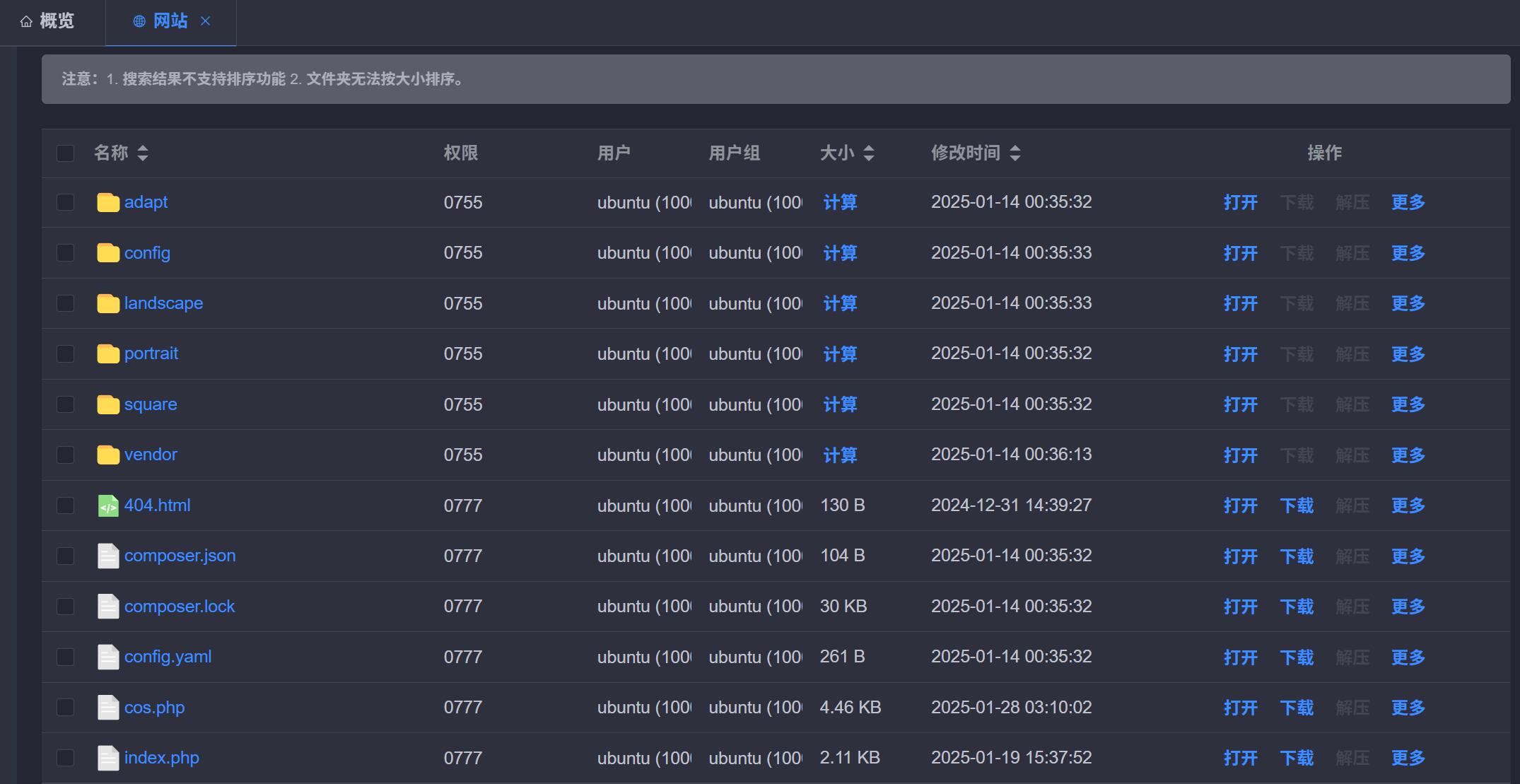
当前主要的结构目录如下:
index.php
adapt(文件夹)
index.php
landscape(文件夹)
index.php
portrait(文件夹)
index.php
设置example.com的反向代理:

例如访问example.com/adapt就是自适应的api,example.com/landscape就是横屏的api。
至此就大功告成了。

